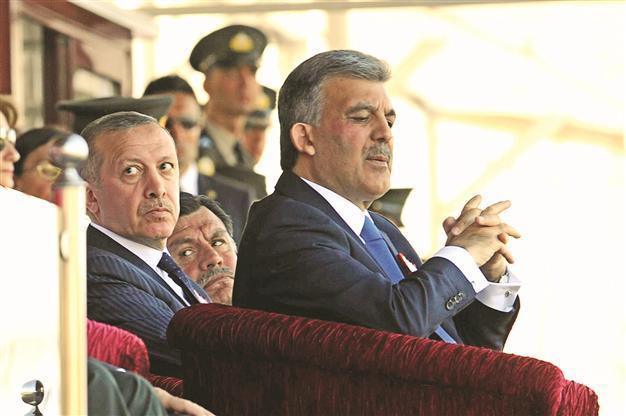Court clears way for Gül to re-run top post
ANKARA

This 2011 file photo shows PM Recep Tayyip Erdoğan (R), Constitutional Court head Haşim Kılıç (C) and President Abdullah Gül during a ceremony in Ankara. The Constitutional Court decides to fix Gül’s term to seven years, ending a long-running debate. DAILY NEWS photo, Selahattin SÖNMEZ
President Abdullah Gül’s mandate is seven years, and he can stand for re-election for another five years, Turkey’s top court has announced, putting an end to the ambiguity over the timing of the presidential elections.However, by allowing Gül to run again, the Constitutional Court’s ruling could ignite a fresh debate given Prime Minister Recep Tayyip Erdoğan well-known plans to become president in 2014. The ruling also gives Gül an upper hand in the period ahead, especially in potential disagreements between him and the government.
The Constitutional Court’s verdict ended confusion over Gül’s mandate which began in 2007 after the government enacted constitutional changes that allowed the election of presidents in popular votes for a five-year term with the chance to be re-elected. The law, endorsed by the government last year, underlined that Gül’s term was seven years, but banned Gül and other former living presidents from running for the post again. The main opposition Republican People’s Party (CHP) brought the law to the court in early 2012.
The Constitutional Court’s ruling failed to satisfy either the opposition parties or the government as it runs counter to both sides’ political plans. The opposition parties believed Gül’s term would end this August under the current 5+5 system and that he could stand for the elections. The government, however, while approving that Gül’s term was seven years, said he had no chance to run for re-election.
Along with Gül, former presidents Ahmet Necdet Sezer, Süleyman Demirel and Kenan Evren will also be able to run for re-election in presidential elections should they wish to do so.
Opposition critical toward ruling
The CHP strongly criticized the Constitutional Court for its partial annulment of the law and for allowing Gül to remain in his post until 2014.
“The Constitutional Court has approved that the articles of the Constitution could be changed by the laws. It put itself in the middle of a big discussion and tarnished its credibility,” Akif Hamzaçebi, the deputy parliamentary group leader of the CHP, said June 15.
“The court affirmed the seven-year mandate of Gül according to the old regulations. But it gave him the chance to be re-elected for another five years according to existing regulations. We do not find this an accurate verdict,” he said.
Emine Ülker Tarhan, a senior CHP member and deputy parliamentary group leader, accused the court of giving a political verdict and violating the Constitution. “In an environment where the judiciary has become politicized and justice has been sacrificed to other sort calculations, this ruling is not a surprise,” she said in a written statement.
Burhan Kuzu, the head of a constitution commission from the Justice and Development Party (AKP), praised the high court’s court verdict on the length of Gül’s mandate but disapproved of its decision to allow him to stand again.
“I have always said this. His mandate is seven years, but he has no chance to be re-elected because the current law stipulates a popular vote for presidential elections under the formula known as 5+5. There is no such formula for 7+5,” he said.
Devlet Bahçeli, leader of the Nationalist Movement Party (MHP), criticized the court’s decision and accused it of giving an arbitrary decision. “This ruling of the Constitutional Court has nothing to do with objectivity, compatibility and justice given the fact the president’s mandate has been set as 5+5,” he said in a written statement. He also accused the court of giving a political decision on the matter and of violating the Constitution.
Peace and Democracy Party (BDP) deputy group chair Hasip Kaplan, for his part, expressed his appreciation for the high court’s ruling.
“From the very beginning of this debate, we said that Gül’s term in office is seven years. The biggest mistake of the AKP on this issue was to amend a constitutional article with a legal regulation and breach his right to run for the presidency again in the next elections,” Kaplan said.
He also indicated that a fresh debate is about to begin as Gül has gained the right to run for the presidency in the next term. “It’s hard to guess whether he will be a candidate or not, but a fresh debate on the issue will be ignited in the coming days,” Kaplan said.
Parliamentary Speaker Cemil Çiçek underlined that it was a court verdict which everyone had to abide by.
Putin-Medvedev style swap?
With the court’s ruling, a number of scenarios for 2104 have begun floating around in the capital. Though much depends on Gül’s personal choice on whether to run for the presidency or not, many observers believe the president could return to active politics as the head of the AKP after his mandate expires. Gül co-founded the AKP with Erdoğan in 2001 and served as the first prime minister of the party in early 2003.
However, another important factor is Erdoğan’s ambitions to adopt a presidential system for Turkey with a powerful president who would appoint the prime minister, just like in France. Many believe this would make the picture more complicated in 2014.
Deputy Prime Minister Beşir Atalay told reporters that the decision was a positive one and added that a different decision would make things difficult in Turkey.
“We are in the middle of June. In the case of a contrary decision, presidential elections should have happened in the middle of August. The Constitutional Courts do not give judicial verdicts, they also look at social and political conditions,” he said.
















